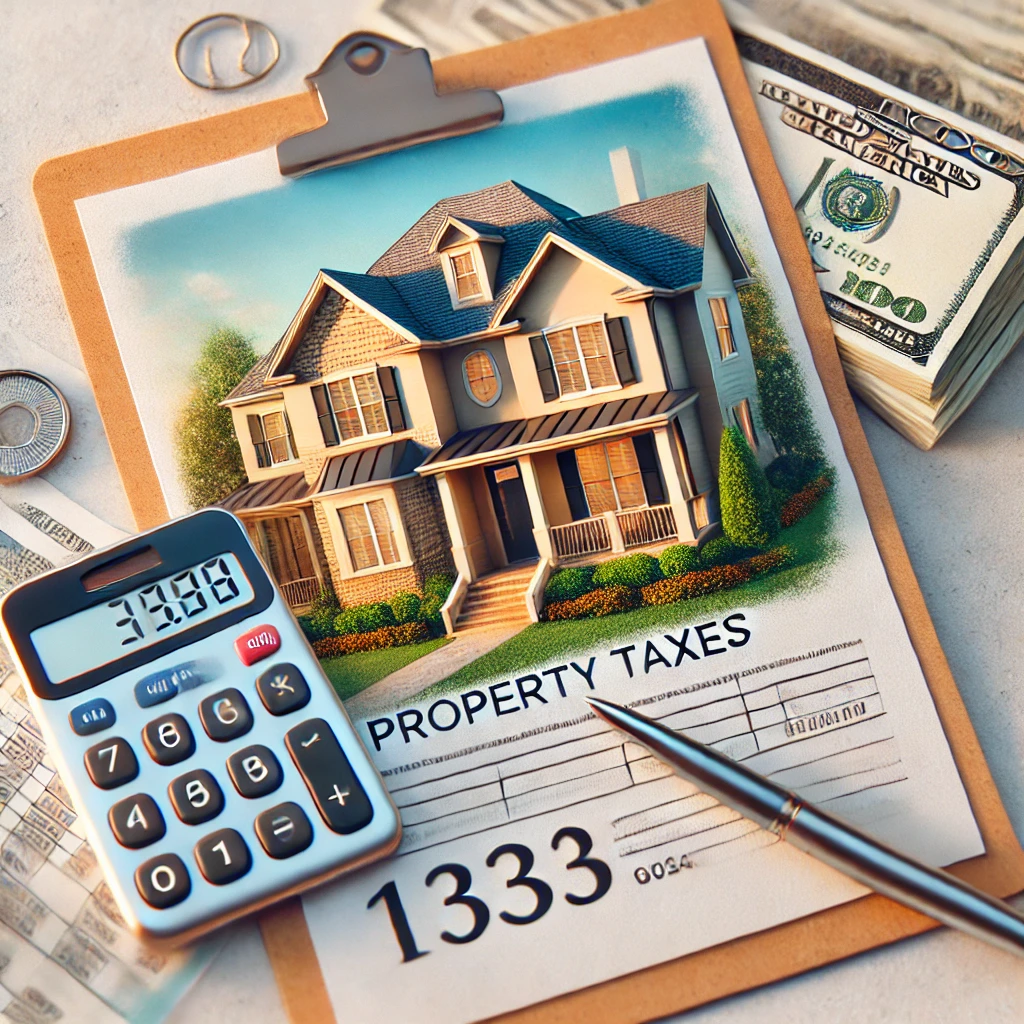Property Tax in Georgia: Everything Homeowners and Investors Need to Know

Property Tax in Georgia: Everything Homeowners Need to Know
Understanding property taxes in Georgia is crucial for homeowners, real estate investors, and anyone planning to buy or sell property. Property taxes fund essential services like schools, roads, and public safety, making them a key part of local government revenue. Knowing how property taxes are calculated, when they are due, and what exemptions are available can help you save money and avoid surprises.
In this guide, we’ll explore the ins and outs of property taxes in Georgia, including how they are calculated, the different rates by county, exemptions you may qualify for, and the steps to take if you need to appeal your property’s assessed value.
How Property Taxes Are Calculated in Georgia
In Georgia, property taxes are calculated based on the assessed value of your home, which is 40% of the property’s fair market value. The local millage rate is then applied to the assessed value to determine the total property tax bill.
Formula for Property Tax Calculation:
Assessed Value x Millage Rate = Property Tax
- Assessed Value: This is 40% of the fair market value of your property. For example, if your home is worth $300,000, the assessed value would be $120,000 (40% of $300,000).
- Millage Rate: The millage rate is the amount of tax per $1,000 of assessed property value. For example, if the millage rate in your county is 25 mills, you would pay $25 for every $1,000 of assessed value.
Example Calculation:
| Scenario | Details |
|---|---|
| Fair Market Value | $300,000 |
| Assessed Value (40%) | $120,000 |
| Millage Rate | 25 mills |
| Property Tax Due | $3,000 |
In this example, with a millage rate of 25 mills, a homeowner with a $300,000 property would owe $3,000 in property taxes.
Property Tax Rates by County in Georgia
Property tax rates, also known as millage rates, vary significantly across Georgia’s 159 counties. These rates are set by local governments and can fluctuate based on funding needs for public services like schools, police, fire departments, and road maintenance.
| County | Millage Rate |
|---|---|
| Fulton County | 30.3 mills |
| Gwinnett County | 22.25 mills |
| Cobb County | 23.53 mills |
| DeKalb County | 20.81 mills |
Urban counties, such as Fulton and DeKalb, often have higher millage rates than rural areas. It’s important to check the current millage rate for your county when estimating your property tax bill.
Property Tax Exemptions in Georgia
Georgia offers several property tax exemptions that can reduce your taxable amount and lower your annual tax bill. Here are some of the most common exemptions:
-
Homestead Exemption: Reduces the taxable value of your primary residence by $2,000. To qualify, you must occupy the home as your primary residence and apply for the exemption by April 1.
-
Senior Citizens Exemption: Homeowners aged 65 and older may qualify for additional property tax reductions, including school tax exemptions in some counties.
-
Disabled Veterans Exemption: Veterans with a 100% service-connected disability can receive substantial property tax reductions, sometimes eliminating the tax liability entirely.
When Are Property Taxes Due in Georgia?
Property tax bills in Georgia are typically issued in the fall, with due dates ranging from October to December, depending on the county. Most counties send out tax bills between August and September, giving homeowners time to pay by the deadline.
Important Deadlines:
- Tax Bills Sent: Typically August-September
- Taxes Due: Generally October-December
- Late Penalties: If you fail to pay your property taxes by the due date, you may be subject to late fees and interest charges. In extreme cases, unpaid property taxes can lead to a lien being placed on the property or even foreclosure.
Appealing Property Tax Assessments
If you believe your property has been overvalued by the county tax assessor, you have the right to file an appeal. This is important because an inflated assessment means you’ll be paying more in property taxes than you should.
Steps to Appeal Your Property Tax Assessment:
-
File an Appeal: You must file your appeal with your local county tax assessor’s office within 45 days of receiving your property tax assessment notice.
-
Provide Evidence: Gather evidence to support your case, such as recent sales of comparable properties or an independent appraisal showing a lower market value.
-
Attend a Hearing: If the county tax assessor doesn’t adjust the assessed value, you may need to attend a hearing where you can present your evidence.
Successfully appealing your assessment can lower your property tax bill for future years.
Frequently Asked Questions About Property Taxes in Georgia
How are property taxes calculated in Georgia?
Property taxes are calculated by multiplying your property’s assessed value (40% of its market value) by the local millage rate.
What is a millage rate?
A millage rate is the amount of tax per $1,000 of assessed property value. Each county in Georgia sets its own millage rate.
How do I qualify for property tax exemptions?
To qualify for most property tax exemptions, such as the homestead exemption, you must own and occupy the property as your primary residence. Additional exemptions may be available for seniors, veterans, and disabled homeowners.
Can property taxes increase each year?
Yes, property taxes can increase each year if the market value of your home rises or if the local government raises the millage rate.
What happens if I don’t pay my property taxes on time?
If you fail to pay your property taxes on time, you may incur late fees and interest. In extreme cases, the county could place a lien on your property or initiate foreclosure proceedings.
How do I appeal my property tax assessment?
To appeal your property tax assessment, contact your local county tax assessor’s office within 45 days of receiving your assessment notice. You’ll need to provide evidence to support your case.
Do seniors get any additional property tax benefits in Georgia?
Yes, seniors aged 65 and older may qualify for additional exemptions, including reductions in school taxes, depending on the county.
Conclusion
Property taxes are an essential part of homeownership in Georgia, but understanding how they are calculated and knowing what exemptions are available can help reduce your financial burden. If you believe your property has been overvalued, don’t hesitate to appeal the assessment and potentially save on future tax bills.
For personalized assistance with property tax questions or to learn more about tax-saving strategies, contact Gold Peach Realty at (770-283-1223) or visit us online at www.goldpeachrealty.com.
Categories
- All Blogs (597)
- Achasta Golf Community (77)
- Cleveland, GA (43)
- Dacula, GA (43)
- Dahlonega GA (119)
- Dawsonville, GA (44)
- Gainesville, GA (46)
- Gold Peach Realty (5)
- Helen, GA (44)
- Home Buying Tips (17)
- Home Décor And Interior Design (7)
- Home Improvement Tips (15)
- Home Selling Tips (20)
- Homes For Sale (51)
- Lake Lanier, GA (70)
- Local Events (13)
- Local Guides (17)
- Mortgage And Finance Tips (23)
- North Georgia (11)
Recent Posts










GET MORE INFORMATION

